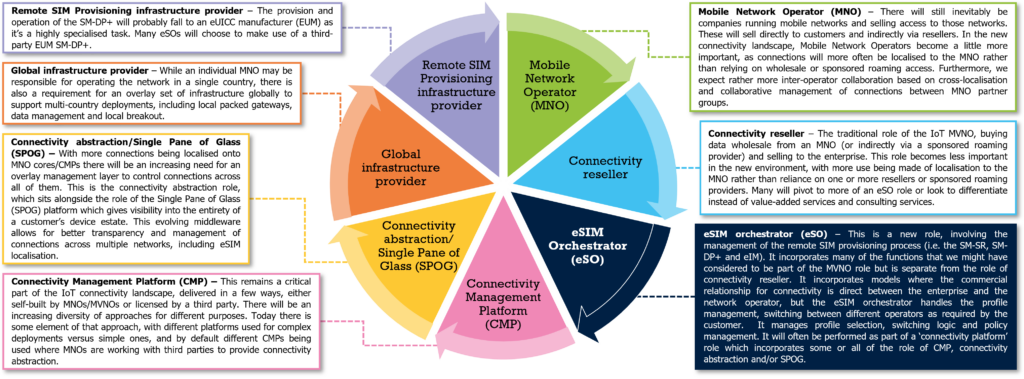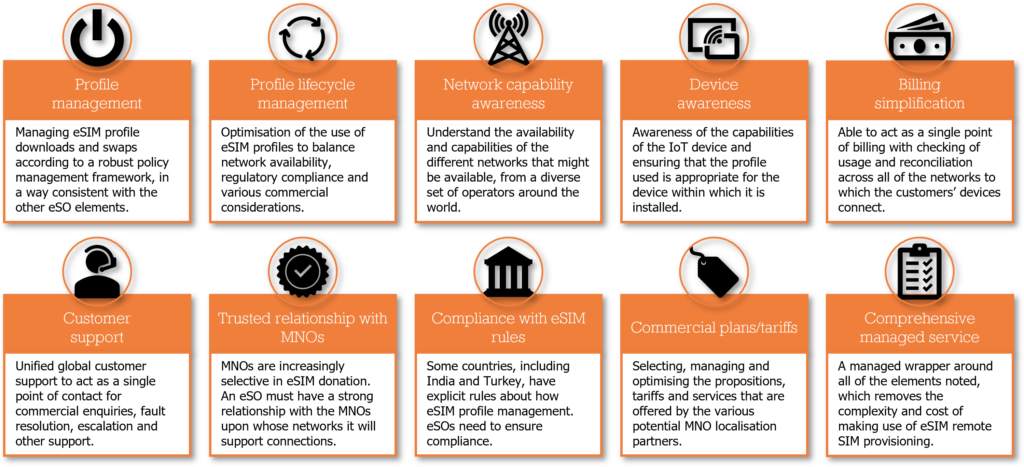News
02 June 2025
Reading Time: 3 mins
News
02 June 2025
Reading Time: 3 mins

Eseye
IoT Hardware and Connectivity Specialists
LinkedInGUILDFORD / READING
The arrival of the new SGP.32 eSIM standard, as well as new regulations and evolving industry dynamics, will transform the market for cellular-based IoT connectivity, including the emergence of a new role, eSIM orchestrator
Businesses relying on globally connected IoT devices are facing a major shift in how these assets will need to be managed, driven by new technical standards and evolving market complexities, according to a new report released by industry research firm Transforma Insights.
Its latest analysis, detailed in a Position Paper, ‘eSIM Orchestration: Driving the Next Wave of IoT Connectivity’, produced in collaboration with global IoT connectivity specialists Eseye, highlights that upcoming technologies like the SGP.32 standard for eSIMs, coupled with more selective network operator policies, will compel connectivity providers to adopt new strategies and new specialist roles, such as an ‘eSIM Orchestrator’, to maintain control and efficiency.
The report indicates that the era of simple, unfettered global connectivity for business devices is evolving, presenting new complexities for businesses. The key challenges and developments driving this transformation include:
“Enterprises are navigating a period of significant change in how global device connectivity is delivered and managed,” explains Matt Hatton, Founding Partner at Transforma Insights. “The new SGP.32 standard provides a powerful tool for remote SIM provisioning. In conjunction with a more demanding regulatory and MNO landscape, our analysis points towards a fundamental shift requiring businesses to be more strategic. This is where we see the emergence of roles like the ‘eSIM Orchestrator’ becoming critical.”

This new ‘eSIM Orchestrator’ function, would specialise in managing the complexities of this new environment. According to the paper, key responsibilities and characteristics of such a role would include:

The paper suggests that this shift will move the industry beyond basic connectivity resale towards more sophisticated, managed service models. For businesses, this means that simply acquiring SIMs will no longer be sufficient; a more holistic approach to managing the lifecycle, compliance, and diverse connectivity options of their devices will be necessary.
“The way businesses manage their connected devices globally is undoubtedly transforming,” adds Ian Marsden, co-founder and CTO at Eseye. “Proactive companies will be looking beyond the immediate technical changes, like SGP.32, to understand the broader operational and strategic implications. Having a clear strategy for device connectivity management, which considers the need for specialised eSIM orchestration and unified control, will be increasingly important to de-risk operations, ensure compliance, and maintain a competitive edge.”
Transforma Insights concludes that as reliance on globally connected devices grows, the current evolution in technology and market practices necessitates a significant reassessment of connectivity management strategies for all affected enterprises.
Transforma Insights is a leading research firm focused on the world of IoT, AI and Digital Transformation (DX). Led by seasoned technology industry analysts we provide advice, recommendations and decision support tools for organisations seeking to understand how new technologies will change the markets in which they operate.

Eseye
IoT Hardware and Connectivity Specialists
LinkedInEseye brings decades of end-to-end expertise to integrate and optimise IoT connectivity delivering near 100% uptime. From idea to implementation and beyond, we deliver lasting value from IoT. Nobody does IoT better.
Explore how eSIM orchestrators streamline profile management, billing, and customer support. Plus, discover the seven essential questions every enterprise should ask before choosing a new eSO vendor.
Read whitepaper